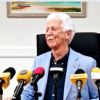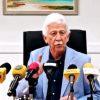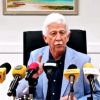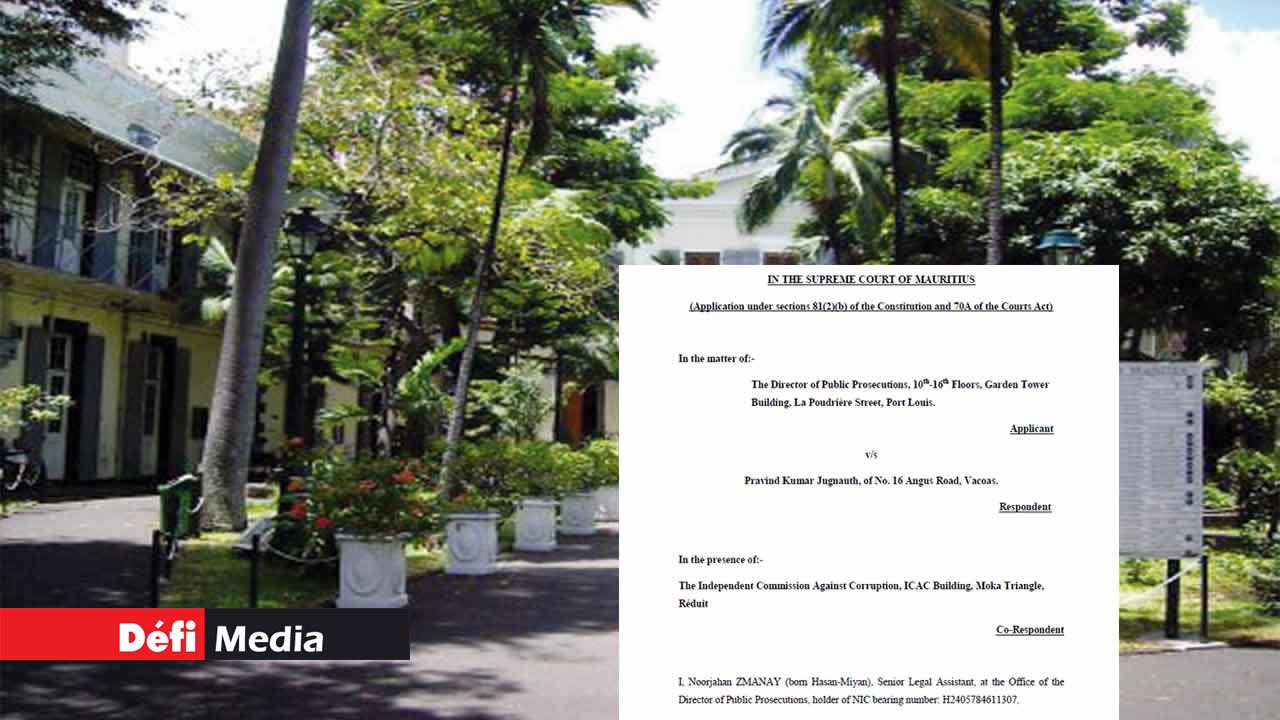
Le Directeur des poursuites publiques (DPP) a fait mercredi 8 juin une demande d’autorisation à la Cour suprême pour saisir le Privy Council afin qu’il puisse faire appel du jugement rendu le 25 mai par le chef juge Kheshoe Parsad Matadeen et le juge Asraf Caunhye.
Dans leur jugement, le chef juge Kheshore Parsad Matadeen et le juge Asraf Caunhye ont renversé le verdict de la cour intermédiaire rendu le 30 juin 2015 condamnant Pravind Jugnauth, leader du MSM et ministre des Finances depuis le 26 mai, à 12 mois de prison dans l’affaire MedPoint.
Le DPP, dans un affidavit juré en Cour suprême mercredi 8 juin, a mis en avant plusieurs raisons pour justifier sa démarche de faire appel du jugement de la Cour suprême au Privy Council.
Découvrez l’affidavit du DPP dans son intégralité :
IN THE SUPREME COURT OF MAURITIUS (Application under sections 81(2)(b) of the Constitution and 70A of the Courts Act) In the matter of:- The Director of Public Prosecutions, 10th-16th Floors, Garden Tower Building, La Poudrière Street, Port Louis. Applicant v/s Pravind Kumar Jugnauth, of No. 16 Angus Road, Vacoas. Respondent In the presence of:- The Independent Commission Against Corruption, ICAC Building, Moka Triangle, Réduit Co-Respondent I, Noorjahan ZMANAY (born Hasan-Miyan), Senior Legal Assistant, at the Office of the Director of Public Prosecutions, holder of NIC bearing number: H2405784611307, MAKE SOLEMN AFFIRMATION AS A MUSLIM AND SAY THAT:- I have been duly authorised to solemnly affirm this affidavit on behalf of the Applicant.
- The Respondent was prosecuted before the Intermediate Court for the offence of Conflict of Interests, in breach of section 13(2) and (3) of the Prevention of Corruption Act, on an information which was solemnly affirmed by an officer of the Co-Respondent. Copy of the Information dated 14th March 2014, bearing Cause Number IR/L 265/14 is herewith attached and marked as Annex A.
- On 30th June 2015, the Respondent was convicted by the Intermediate Court and was, on 2nd July 2015, sentenced to 12 months’ imprisonment. The sentence was, pursuant to section 3(1)(b) of the Community Service Order Act, suspended pending a community service suitability report from the Probation Office. On 16th July 2015, upon the filing of a favourable report by the Probation Officer, the Respondent was, pursuant to section 4(2)(b) of the Community Service Order Act, asked whether he consented to a community service order. The Respondent gave no express consent to such an order and informed the Court that he intended to appeal against the judgment. In the absence of the Respondent’s consent to a community service order, the Intermediate Court sentenced him to the original 12 months’ imprisonment and further ordered him to pay Rs. 500 as costs. Copies of the judgment of the Intermediate Court dated 30th June 2015 and the sentence are herewith attached and respectively marked as Annex B and Annex C.
- The Respondent appealed against both his conviction and sentence to the Supreme Court. At the hearing of the appeal, the Supreme Court was invited by the Respondent to disregard the original grounds of appeal and to consider only the amended grounds of appeal set out in the notice of appeal dated 27th July 2015. The grounds were grouped by the appellate court under the following headings: Ground 1 – The mental element of the offence Ground 2 – The meaning of “personal interest” Ground 3 – Errors in relation to conflict of interest Ground 4 – The construction of “any proceedings” relating to a “decision” “which a public body is to take” Ground 5 – Disclosure Ground 6 – Charging Ground 7 – Injustice in sentencing
- In its judgment dated 25th May 2016, the Supreme Court (Honourable Chief Justice, K.P. Matadeen and Honourable Judge A.A. Caunhye) allowed the appeal on Grounds 1, 2 and 3, and, accordingly, quashed the conviction and sentence of the Respondent. Copies of the notice of appeal dated 27th July 2015, judgment of the Supreme Court dated 25th May 2016, bearing SCR 8798 and the transcripts of the proceedings before the appellate court of 12th and 13th January 2016 are herewith attached and respectively marked as Annex D, Annex E and Annex F.
- The Supreme Court observed in its judgment that it was the first occasion on which the offence of Conflict of Interests, under section 13(2) of the Prevention of Corruption Act, has come before it for determination and it raises fundamental legal issues relating to the interpretation of that offence.
- The Applicant considers that the judgment of the Supreme Court is wrong in law and raises important questions as to the correct definition of the elements of the offence of Conflict of Interests under section 13(2) of the Prevention of Corruption Act, which are of great general public importance to the future administration of justice in Mauritius.
- The Applicant accordingly seeks leave to appeal, pursuant to sections 81(2)(b) of the Constitution and 70A of the Courts Act, against the said judgment of the Supreme Court to the Judicial Committee of the Privy Council on the following grounds: (a) Whether, as the Supreme Court held, the State is, for the purpose of establishing guilt under section 13(2) of the Prevention of Corruption Act, required to prove that an accused knew that he possessed a conflict of interests and, with that knowledge, intended to act in breach of his duty not to take part in the proceedings of the relevant public body or whether it is sufficient for the State to prove that the accused knew each of the objective facts and circumstances that a reasonable person would regard as giving rise to a conflict of interests and that he failed thereafter to abstain from participation in those proceedings? (b) Whether the Supreme Court erred in law in holding that it was a defence for an accused charged with an offence under section 13(2) of the Prevention of Corruption Act to establish, on a balance of probabilities, that he had acted in good faith, namely that he had acted under a honest and reasonable belief as to the circumstances, which if true, would have rendered his act devoid of guilty intent? (c) Whether, as the Supreme Court held, for the purpose of establishing the existence of a conflict of interests pursuant to section 13(2) of the Prevention of Corruption Act, the expression “personal interest” in section 13(2) is to be construed, in its statutory context, as preventing the State from relying on the shareholding of the relative of a public official in a company? (d) Whether, as the Supreme Court held, once a contract has been awarded by a public body to a company in which the relative of a public official holds shares, that public official possesses no conflicting interests in decisions relating to the execution of the contract, such as internal arrangements relating to payment of the purchase price, and may participate in them without infringing section 13(2) of the Prevention of Corruption Act?
- I am advised and verily believe that the pronouncements of the Supreme Court in this case are capable, if not reversed, of constituting a precedent not conducive to the public interest in the proper administration of justice, and there are no means of preventing these consequences other than by way of an appeal to the Judicial Committee of the Privy Council. Moreover, the questions which arose in this case are likely to occur often in the future.
- I am further advised and verily believe that the decision of the Supreme Court in this case will have a bearing on a number of other cases involving “conflict of interests” which are either awaiting Applicant’s decision as to charge or trial.
- I am advised and verily believe that, in the circumstances, it is urgent and necessary that the Applicant be granted leave to appeal to the Judicial Committee of the Privy Council against the judgment of the Supreme Court delivered on 25th May 2016, by the Honourable Chief Justice, K.P. Matadeen and Honourable Judge A.A. Caunhye, bearing record number: SCR 8798.
- I, therefore, move for an Order from the Honourable Court: (a) granting the Applicant conditional leave to appeal to the Judicial Committee of Privy Council against the judgment delivered on 25th May 2016, by the Honourable Chief Justice, K.P Matadeen and Honourable Judge A.A Caunhye, bearing record number: SCR 8798; (b) fixing the conditions and time limit within which the necessary steps for the purpose of procuring and preparation of the record and its despatch to England as the Court, having regard to all the circumstances of the case, may think it reasonable to impose; (c) granting such order as the Court may deem fit and necessary to make.
- I, therefore, pray accordingly. Solemnly affirmed by the abovenamed deponent) in Chambers, Supreme Court House, at Port Louis) this 8th day of June, 2016. K. Parson State Attorney and Attorney for the Applicant

Notre service WhatsApp. Vous êtes témoins d`un événement d`actualité ou d`une scène insolite? Envoyez-nous vos photos ou vidéos sur le 5 259 82 00 !















![[Info Soirée] : « NOU PE ROD LA ZISTIS POU SA BANN VIKTIM LA »](https://files.defimedia.info/sites/default/files/styles/square_thumbnail/public/thumbnail-221125.jpg?itok=rba_H9FJ)
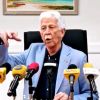
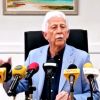
![[En images] Marche du Mouvement pour la sécurité et la justice routière à Rose-Hill](https://files.defimedia.info/sites/default/files/styles/square_thumbnail/public/1_37.jpg?itok=WchNCx9t)
